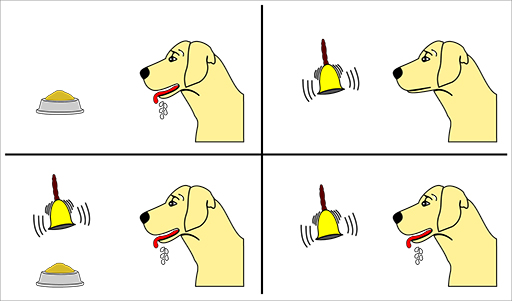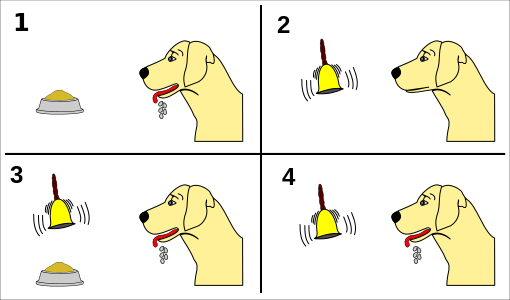2.2.1 Pavlov’s dogs
Like many scientific breakthroughs (such as the discovery of penicillin), the concept of classical conditioning was discovered accidentally.
During the 1890s, Ivan Pavlov was researching salivation in dogs in response to being fed. He predicted the dogs would salivate in response to the food placed in front of them, but he noticed that his dogs would begin to salivate whenever they heard the footsteps of his assistant who was bringing them the food. Therefore, the dogs started to anticipate the arrival of food (resulting in salivation) with the footsteps of the person bringing them the food – an example of classical conditioning. This initial work of Pavlov’s has also led to this behaviour being referred to as ‘Pavlovian conditioning’.
Another example of Pavlovian conditioning is illustrated in Figure 8.
Can you number these images 1–4 to show the order in which the conditioning has occurred?
Figure 9 shows the order of conditioning as it occurs.
In this example, a bell is being used to ‘train’ the dog to associate food with the sound of the bell:
- In image 1, the dog is introduced to the food alone – and so salivates to the presence of the food.
- In image 2, the dog is introduced to the sound of the bell alone – and since the dog cannot associate this sound with anything rewarding, there is no salivation response.
- In image 3, the food is re-introduced at the same time as the bell is rung, and the presence of the food induces the salivation. Eventually over time this repeated pairing of food and bell means the dog learns the association between food and the sound of the bell.
- Eventually, as in image 4, the sound of the bell alone is sufficient to elicit the salivation associated with the food.
In brain terms, dopamine would usually be released in image 1 in response to the presentation of food but, over time, after learning the association between the food and the bell, dopamine would start to be released just to the sound of the bell.
In real terms what this means is that a person who repeatedly drinks, for example, in a particular pub, will find it very difficult to walk past that pub without being motivated by the release of dopamine to go in for a drink.


